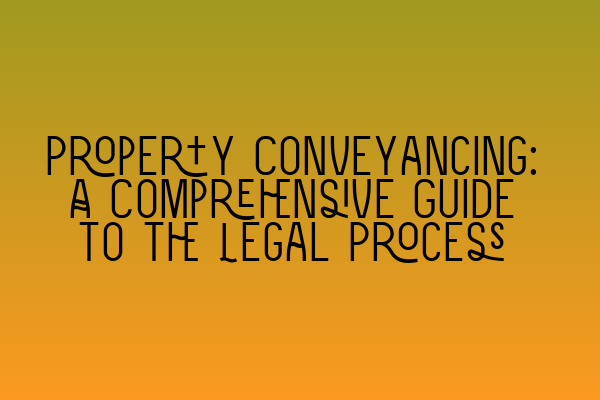Property Conveyancing: A Comprehensive Guide to the Legal Process
Are you planning to buy or sell a property? Congratulations! It’s an exciting journey that requires thorough understanding of the legal process. Whether you’re a seasoned property investor or a first-time buyer, it’s essential to have a clear understanding of property conveyancing. In this comprehensive guide, we will walk you through the intricacies of property conveyancing, step by step.
What is Property Conveyancing?
Property conveyancing refers to the legal process of transferring the ownership of a property from one person or entity to another. It involves a series of tasks and checks to ensure a smooth and legally-binding transaction. The process is generally carried out by solicitors or conveyancers who specialize in property law.
Step 1: Instruction
The first step in the property conveyancing process is to instruct a solicitor or conveyancer. This professional will act on your behalf, ensuring that all legal aspects of the transaction are handled correctly. It’s important to choose an experienced solicitor who specializes in property law to ensure a smooth and hassle-free process.
Step 2: Pre-contract Stage
During the pre-contract stage, your solicitor will conduct various searches and checks to gather essential information about the property. These searches typically include:
1. Local Authority Searches: These searches provide information about planning permissions, local development plans, and any potential issues that may affect the property.
2. Environmental Searches: These searches assess potential risks from contaminated land, flooding, or other environmental hazards.
3. Water and Drainage Searches: These searches verify the property’s water and drainage connections, ensuring there are no issues with the water supply or drainage system.
4. Land Registry Searches: These searches confirm ownership details and reveal any restrictions or legal charges on the property.
Step 3: Drafting Contracts
Once all the necessary searches and checks have been completed, your solicitor will draft the contract. The contract includes vital information about the agreed price, completion date, and any special conditions. It’s crucial to review the contract thoroughly and seek legal advice if needed before signing.
Step 4: Exchange of Contracts
At this stage, both the buyer and seller will sign the contract, and the solicitors will exchange the signed contracts. This step is legally binding, and a deposit may be required from the buyer. Once the contracts are exchanged, both parties are committed to the transaction.
Step 5: Completion
Completion is the final stage of the property conveyancing process. On the agreed completion date, the buyer’s solicitor will transfer the remaining funds to the seller’s solicitor. Once the seller’s solicitor confirms receipt of funds, the buyer officially becomes the owner of the property. The keys are then handed over, and the process is complete.
Additional Considerations:
Mortgage: If you require a mortgage to purchase the property, your solicitor will work closely with your mortgage lender to arrange the necessary funds and ensure a smooth transaction.
Stamp Duty: Your solicitor will also handle the legal requirements related to stamp duty, ensuring that it is calculated correctly and paid on time.
Leasehold Properties: If you are buying a leasehold property, additional steps are involved, such as obtaining information about service charges, ground rent, and lease terms.
Conclusion:
Property conveyancing is a complex legal process that requires a comprehensive understanding of property law. By instructing an experienced solicitor or conveyancer, you can navigate the process smoothly and avoid potential pitfalls. We hope this comprehensive guide has helped demystify property conveyancing and given you the confidence to embark on your property journey with ease.
Remember, property transactions are significant financial commitments, and seeking professional legal advice is crucial to protect your interests and ensure a successful transaction.
